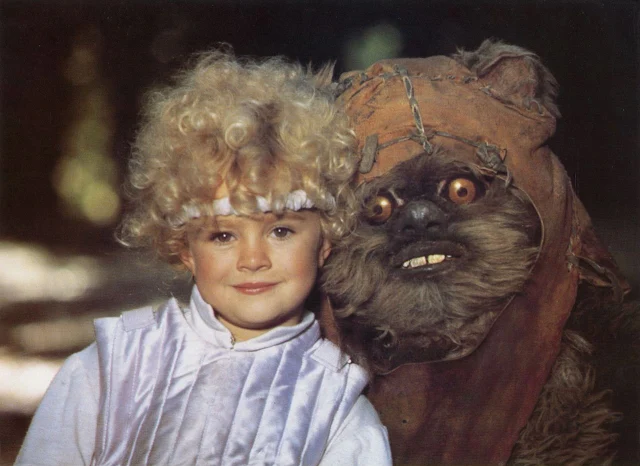George Lucas was captivated by the idea of a seemingly primitive species taking on the might of the technologically advanced Galactic Empire. He initially pondered using the towering, hirsute Wookies—like the beloved character -—as the indigenous revolutionaries. However, Wookies, being proficient in technology and space travel, veered too far from the 'primitive' trope he wished to portray. Lucas wanted a species that exuded an aura of innocence, yet had the resourcefulness to challenge imperial oppression.
Enter the Ewoks: Endor’s forest-dwelling, spear-toting rebels.
 |
| Cindel and Wicket |
While Lucas's films are often categorized as space operas, they rarely shy away from delving into political and historical nuance. A prime example is how the Ewoks serve as a powerful allegory for the Viet Cong during the Vietnam War. This parallel is not accidental; Lucas has publicly admitted that the original "Star Wars" trilogy was influenced by the tumultuous political climate of the 1960s and 1970s, specifically the Vietnam War. His writings from 1973 noted that the core essence of "Star Wars" was about "a large technological empire going after a small group of freedom fighters." The Ewoks, intimately familiar with the dense forests of Endor, were a strategic nightmare for the Empire, much like the Viet Cong’s mastery of jungle warfare baffled the American military.
It's impossible to discuss George Lucas's anti-Vietnam War stance without mentioning "Apocalypse Now," a film he originally developed but later passed on to Francis Ford Coppola. "Apocalypse Now" seethes with the complexities of war, capturing the zeitgeist of an era. Lucas's resonance with the subject matter extends into the "Star Wars" universe. In fact, Harrison Ford, iconic for his portrayal of Han Solo, appeared in "Apocalypse Now" as Colonel Lucas—a character named as a tribute to George Lucas. In interviews, Lucas has frequently mentioned the impact of "Apocalypse Now" on his vision for "Star Wars," emphasizing the interconnectivity of his cinematic pursuits.
As if to underscore the franchise’s continued relevance, more recent entries have inadvertently reflected modern geopolitical shifts. "Revenge of the Sith," released in 2005, has been compared to the post-9/11 landscape of America. While the film predates George W. Bush's "you're either with me or against me" doctrine, it deals with the Emperor tightening his grip on galactic power in a manner eerily reminiscent of the rationalizations used for the Iraq War. Lucas, while not intending this direct comparison, has acknowledged the eerie similarities, signifying the franchise’s adaptability in reflecting contemporary political realities.
The Ewoks, then, are far from mere anthropomorphic distractions. They are an encapsulation of the dichotomies that pervade the "Star Wars" universe—innocence versus cunning, primitivism against technological might, and local ingenuity challenging imperialist ambitions. These contradictions are a microcosm of the thematic richness of George Lucas's magnum opus, a saga that continually refracts the complexities of power dynamics, resistance, and the ravages of war through its narrative lens.
So with that mind, check out the children's fil, Ewok Adventure: Caravan of Courage.














0 comments:
Post a Comment